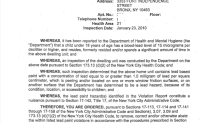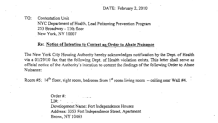An NBC 4 podcast on the fight to make NYCHA better. Click the boxes below to navigate between episodes.
Question Authority is a 6-part podcast about New York's public housing crisis. This is Episode 1, where one woman fights NYCHA after her daughter is found to have elevated lead levels, and wins a $57 million settlement. Listen on Apple Podcasts or Stitcher or listen below.
BEFORE MOVING to the Bailey Houses in the Bronx, Tiesha Jones and her family lived at the Fort Independence Houses for fourteen years. It’s about a 15-minute walk up the road.
“I didn’t really know what lead was, everyone in the community did not have a sense of what it was,” Jones said. “All they knew was that our building was supposed to be free from it because it was built after the 70s.”
Lead is a metal often found in old paint and can be toxic to humans. Jones didn’t worry about lead until January of 2010, when she switched her four-year-old daughter, Dakota, to a new doctor.

“They called me the next day and said, you need to bring her back immediately. We need to retest her,” Jones said. “I was just in panic mode from then. I didn’t know if she was going to die.” The level of lead in Dakota’s blood was at 45 micrograms per deciliter. Kids can be affected by only 5 micrograms per deciliter.
“As a child, Dakota was very skillful. She knew how to tie her shoe very early. And then everything seemed to reverse,” Jones said. “She couldn’t recognize the letters, she was writing things backwards, she didn’t know how to tie her shoe anymore. It just didn’t make any sense to me when I was doing everything right, it just didn’t make sense.”
New York City banned lead paint in 1960, earlier than most other cities. “Lead is very difficult to treat once it’s in the body,” said Dr. Morri Markowitz, the Director of Montefiore’s Lead Program in the Bronx. He’s been working with lead poisoned children for over 40 years.
Kids’ bodies are more sensitive to lead and can absorb it more than adults. At low levels, there aren’t always symptoms, but even then, lead poisoning essentially causes brain damage.
“In kids, when you reach that clinical level, you may have trouble learning, you may be hyperactive, or aggressive,” Markowitz said. “The brain is particularly sensitive to lead, we consider it the critical organ. It takes the least amount of lead to have detrimental effects.”
NYCHA, by law, is supposed to visually check certain apartments every year for lead paint hazards. Usually, that means looking for peeling or cracked paint, especially around areas that get a lot of wear-and-tear like windowsills and doors. Checks are required in apartments where children under 6 live in buildings constructed before 1960—or before 1978, if the owner knows there’s lead.
It’s clear from the court documents that since Fort Independence was constructed after 1960, NYCHA thought there was no lead paint there.

The Health Department was notified. They came to inspect her apartment and found two areas with lead. The DOH ordered NYCHA to get rid of it. NYCHA instead fought the Health Department. Jones was pushed to drastic measures. “We had to move my family out of our home that we had been in since 1999 and go into the shelter, which was horrific for my children,” she said.
What NYCHA did was contest the order to fix it in February. In a statement, they said this was to protect the Authority’s interest and give them time to perform its own testing. “What they will do—typically if there’s a lead violation, the city gets notified, the city goes in, and what NYCHA does is they have their own inspectors to go in, they send it to their own lab, and they try to contest the lead findings,” said Thomas Giuffra, Jones’s lawyer.
A "New York Times" investigation found that 95% of orders from the Health Department to remove lead were contested from 2010 to 2018. NYCHA said they contest orders based off of XRF tests, which is determined through an x-ray, in order to do their own paint chip analysis.

However, in an interview we did with the new NYCHA Chair, Gregory Russ, Russ said that NYCHA will no longer contest abatement orders from the city’s health department. "I don’t have any plans to do that, no. I think our plan would be to sit with the health dept folks and find out where they found the lead, what kind of issues that that raise for compliance and if there’s a compliance issues can we deal with it."
But back then, Tiesha went to lawyer Giuffra after NYCHA fought the order. The Health Department forced NYCHA to do an abatement and Jones moved back in April 2010 and her case against NYCHA started that same year. “It was very rough,” Jones said. “It was strenuous, very long. It started in 2010 and ended in 2018.”
Data from the Department of Health shows that lead poisoning happened to over 2,000 other kids in NYCHA from 2010 to 2018. And while the court case was playing out, the lead issue at NYCHA turned into a scandal.

NYCHA didn’t suspect lead in Jones’s building because it was constructed after 1960—when the city banned it. But the law says they’re supposed to visually check older apartments where kids live for lead every year. According to a Department of Investigation report, NYCHA quietly stopped doing any checks altogether in 2012.
Shola Olatoye, the ex-Chair of NYCHA, didn’t know the apartment checks weren’t happening in 2014 and 2015, the first two years in her role. She found out in 2016—the DOI report says she signed compliance documents anyway.
The federal housing department threatened to take over NYCHA. While that didn’t happen, NYCHA had to accept a Federal Monitor, whose job it is to watch them and make sure they meet lead milestones over the next 20 years.

The Federal Monitor has since shown concern over NYCHA’s recent efforts. In a letter from May 2019, he cited a “total lack of effort” to contact residents to figure out where kids are living, which was part of the deal.
In a report from July 2019, the Monitor’s team wrote they were met with resistance when they found some contractors weren’t using lead-safe work practices. They also wrote that NYCHA has found lead in more than half of its developments, and that it has not yet done visual assessments in the vast majority of apartments that might have lead paint.
“We’re in 2019, all of this has happened, and there are still more children who are being affected,” Jones said.
The monitor’s report found 18 kids had elevated lead levels during the first half of 2019. “We don’t need any more Dakotas,” Jones said. “I don’t want any parent to have to go through what I’ve been through.”
Thousands of NYCHA Apartments to Be Assessed for Lead Paint Risk
The city is planning to go to thousands of NYCHA apartments and look for lead paint that may pose a health risk to residents. Ida Siegal reports.
In 2018, a Bronx jury ruled in favor of Dakota. NYCHA was forced to pay the family $57 million dollars. “No amount of any settlement can reverse what happened to my daughter,” Jones said. “She will always have lead poisoning for the rest of her life.”
Jones partnered with New York State Senator Gustavo Rivera to introduce Dakota’s Law to the state senate. The law would raise the age of children protected and screened from 6 to 18, make insurers cover screening and testing, and require physicians to report elevated blood levels to the health department. It was passed by the Health Committee in May 2019, its first step towards becoming law.
“I would like to tell all the parents out there, whether they’re living in public housing or not, they should speak up and say, ‘when was the last time this apartment was checked for lead?’” Jones said. “If you see peeling paint, anything of that nature, go to the doctor every year to make sure those kids are tested. It’s your right. You know what your child needs, go get it for them.”
Question Authority was researched, written, produced, and edited by Liam McBain. The executive producer is Jessy Edwards, with additional help from Ben Berkowitz and John Cuthbert.

